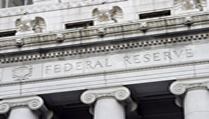 The 2014 Shared National Credit Review (SNC) found significant deterioration in bank standards for leveraged lending and a lack of commitment among banks to follow the March 2013 Interagency Guidance on Leveraged Lending. The SNC is conducted by the Federal Reserve Board, Federal Deposit Insurance Corp and the Office of Comptroller of the Currency.
The 2014 Shared National Credit Review (SNC) found significant deterioration in bank standards for leveraged lending and a lack of commitment among banks to follow the March 2013 Interagency Guidance on Leveraged Lending. The SNC is conducted by the Federal Reserve Board, Federal Deposit Insurance Corp and the Office of Comptroller of the Currency.
The wrist slapping by the feds has been anticipated and has led to a modest decline in bank participation in the leveraged market. (See Banks Begin Cutting Back on Leveraged Lending) Fitch observed last month that banks have begun trying to clean up their acts in advance of next year’s SNC, which is conducted in the first half of the year.
The feds criticized 33.2 percent of all reviewed banks’ leveraged loans, and only 3.3 percent of non-leveraged loans. The review found problems in the borrowers’ ability to repay the loans under adverse conditions, as well as “serious deficiencies in underwriting standards and risk management of leveraged loans. Overall, the SNC review showed gaps between industry practices and the expectations for safe- and- sound banking articulated in the guidance. Thirty-one percent of leveraged transactions originated within the past year exhibited structures that were cited as weak, mainly because of a combination of high leverage and the absence of financial covenants. Other weak characteristics observed included nominal equity and minimal de-leveraging capacity.”
The SNC also found ongoing deterioration in covenant protection (fewer financial maintenance covenants) the use of net, rather than total, debt in leverage covenants, and dilution of senior secured positions through the use of debt-financed stock buybacks.
The SNC also criticized lenders’ risk management practices, including, “inadequate support for enterprise valuations and/or reliance on dated valuations, weaknesses in credit analysis, and overreliance on sponsor’s projections.”
The feds said that due to these findings, they would increase the frequency of their reviews for leveraged lending.